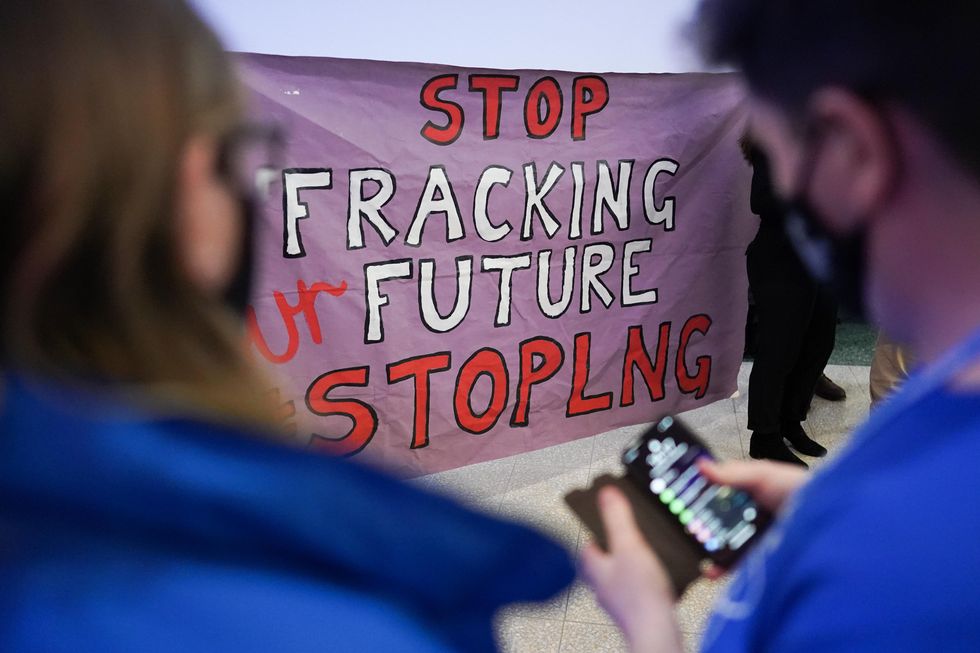Harry Fletcher
Sep 23, 2022
Ed Miliband criticises Jacob Rees-Mogg over lifting fracking ban
IndyTV
Liz Truss's government is facing the first major backlash of her tenure as prime minister after lifting the ban on fracking.
The move has been hit with fierce criticism on both sides of the house, with Conservative MPs hitting out at the policy in the Commons.
The government formally lifted a ban on drilling for shale gas in a bid to boost energy supplies on Thursday. This is despite admitting that there had been no progress in assessing scientific risk and a need to “gather better data” on safety.
It’s an unpopular decision, which some Tory MPs are claiming will be used by opposition MPs against them in key seats at the next election.
Sign up for our free Indy100 weekly newsletter
It’s also very dangerous – and these are some of the reasons why.
The impact on the environment
While there are Tory MPs who are more bothered about fracking's impact on their election chances than the planet, there’s a serious impact on the environment which needs to be considered.
Fracking uses more energy than the more traditional processes of gas and oil extraction. The process has also been linked with the millions of tons of methane being leaked into the atmosphere – and as methane is a more potent greenhouse gas than carbon dioxide, that’s a big problem.
If we were to see widespread fracking in the UK, it would take thousands of drilling points just to produce half of the gas the nation gets through. The size of the operation, with equipment and material being driven across the country needs to be considered too.
Respiratory issues

Fracking was first banned back in 2019 by the UK government after scientific studies highlighted the fact it wasn’t possible to rule out “unacceptable” consequences for people living near fracking sites.
The report from the Oil and Gas Authority (OGA) focused on a number of potential health problems, one being respiratory.
Residents living near wells have reported problems with coughing and shortness of breath – and it’s down to toxic gases like benzene being released into the atmosphere by the process.
A study from the Johns Hopkins School of Public Health involving more than 400,000 patients of Pennsylvania’s Geisinger clinic also found a correlation between fracking and increased cases of asthma.
Issues surrounding pregnancy
Respiratory problems aren’t the only health risk surrounding the practice either. Research has shown that the chemicals involved in fracking are dangerous to pregnant women. Researchers at West Virginia found that chemicals found in the waters near wastewater disposal sites can harm developing foetuses.
The study showed that of the 11,000 women with newborns in proximity to fracking sites, there was a 40 per cent increase in the chances of having a premature baby.
Increased risk of earthquakes
Back in 2019, the UK’s only active fracking site at Preston New Road in Lancashire was shut down after the process caused a number of earth tremors, and it’s more widespread than you might think.
According to Friends of the Earth, 57 earthquakes were detected in the county in 2018 while fracking was taking place at the Preston New Road site. Jacob Rees-Mogg has floated the idea of upping the the limit of 0.5 on the Richter scale for fracking induced tremors to 2.5 this week.
Accidents could be devastating
Spills around fracking sites continue to be an issue in the US. One case in Dimock, Pennsylvania saw faulty gas wells blamed for leaking methane into the ground water. As a result, the drinking water source was destroyed.
According to the British Geological Survey, “Groundwater may be potentially contaminated by extraction of shale gas both from the constituents of shale gas itself, from the formulation and deep injection of water containing a cocktail of additives used for hydraulic fracturing and from flowback water which may have a high content of saline formation water.”
The New York State Department of Health also introduced a one year ban on the practice in 2014 in order to assess the health risks involved and concluded in 2014 that it should be banned due to “significant public health risks ”.
Have your say in our news democracy. Click the upvote icon at the top of the page to help raise this article through the indy100 rankings.
Top 100
The Conversation (0)














